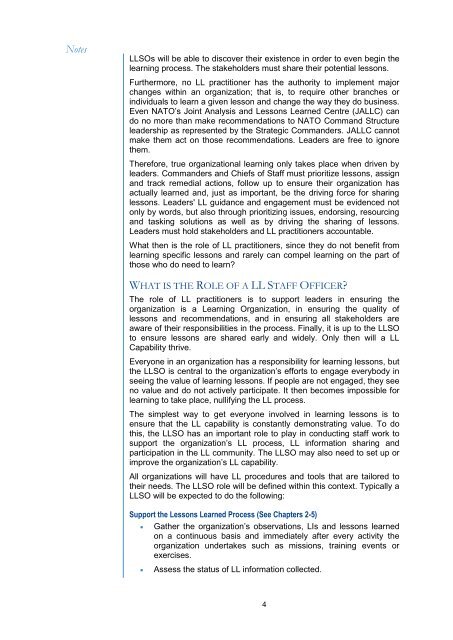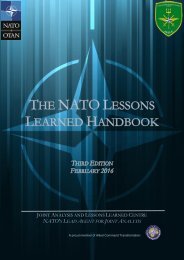JOINT ANALYSIS LESSONS LEARNED CENTRE NATO'S LEAD AGENT JOINT ANALYSIS
1ViofYb
1ViofYb
You also want an ePaper? Increase the reach of your titles
YUMPU automatically turns print PDFs into web optimized ePapers that Google loves.
Notes<br />
LLSOs will be able to discover their existence in order to even begin the<br />
learning process. The stakeholders must share their potential lessons.<br />
Furthermore, no LL practitioner has the authority to implement major<br />
changes within an organization; that is, to require other branches or<br />
individuals to learn a given lesson and change the way they do business.<br />
Even NATO’s Joint Analysis and Lessons Learned Centre (JALLC) can<br />
do no more than make recommendations to NATO Command Structure<br />
leadership as represented by the Strategic Commanders. JALLC cannot<br />
make them act on those recommendations. Leaders are free to ignore<br />
them.<br />
Therefore, true organizational learning only takes place when driven by<br />
leaders. Commanders and Chiefs of Staff must prioritize lessons, assign<br />
and track remedial actions, follow up to ensure their organization has<br />
actually learned and, just as important, be the driving force for sharing<br />
lessons. Leaders' LL guidance and engagement must be evidenced not<br />
only by words, but also through prioritizing issues, endorsing, resourcing<br />
and tasking solutions as well as by driving the sharing of lessons.<br />
Leaders must hold stakeholders and LL practitioners accountable.<br />
What then is the role of LL practitioners, since they do not benefit from<br />
learning specific lessons and rarely can compel learning on the part of<br />
those who do need to learn?<br />
WHAT IS THE ROLE OF A LL STAFF OFFICER?<br />
The role of LL practitioners is to support leaders in ensuring the<br />
organization is a Learning Organization, in ensuring the quality of<br />
lessons and recommendations, and in ensuring all stakeholders are<br />
aware of their responsibilities in the process. Finally, it is up to the LLSO<br />
to ensure lessons are shared early and widely. Only then will a LL<br />
Capability thrive.<br />
Everyone in an organization has a responsibility for learning lessons, but<br />
the LLSO is central to the organization’s efforts to engage everybody in<br />
seeing the value of learning lessons. If people are not engaged, they see<br />
no value and do not actively participate. It then becomes impossible for<br />
learning to take place, nullifying the LL process.<br />
The simplest way to get everyone involved in learning lessons is to<br />
ensure that the LL capability is constantly demonstrating value. To do<br />
this, the LLSO has an important role to play in conducting staff work to<br />
support the organization’s LL process, LL information sharing and<br />
participation in the LL community. The LLSO may also need to set up or<br />
improve the organization’s LL capability.<br />
All organizations will have LL procedures and tools that are tailored to<br />
their needs. The LLSO role will be defined within this context. Typically a<br />
LLSO will be expected to do the following:<br />
Support the Lessons Learned Process (See Chapters 2-5)<br />
Gather the organization’s observations, LIs and lessons learned<br />
on a continuous basis and immediately after every activity the<br />
organization undertakes such as missions, training events or<br />
exercises.<br />
<br />
Assess the status of LL information collected.<br />
4



